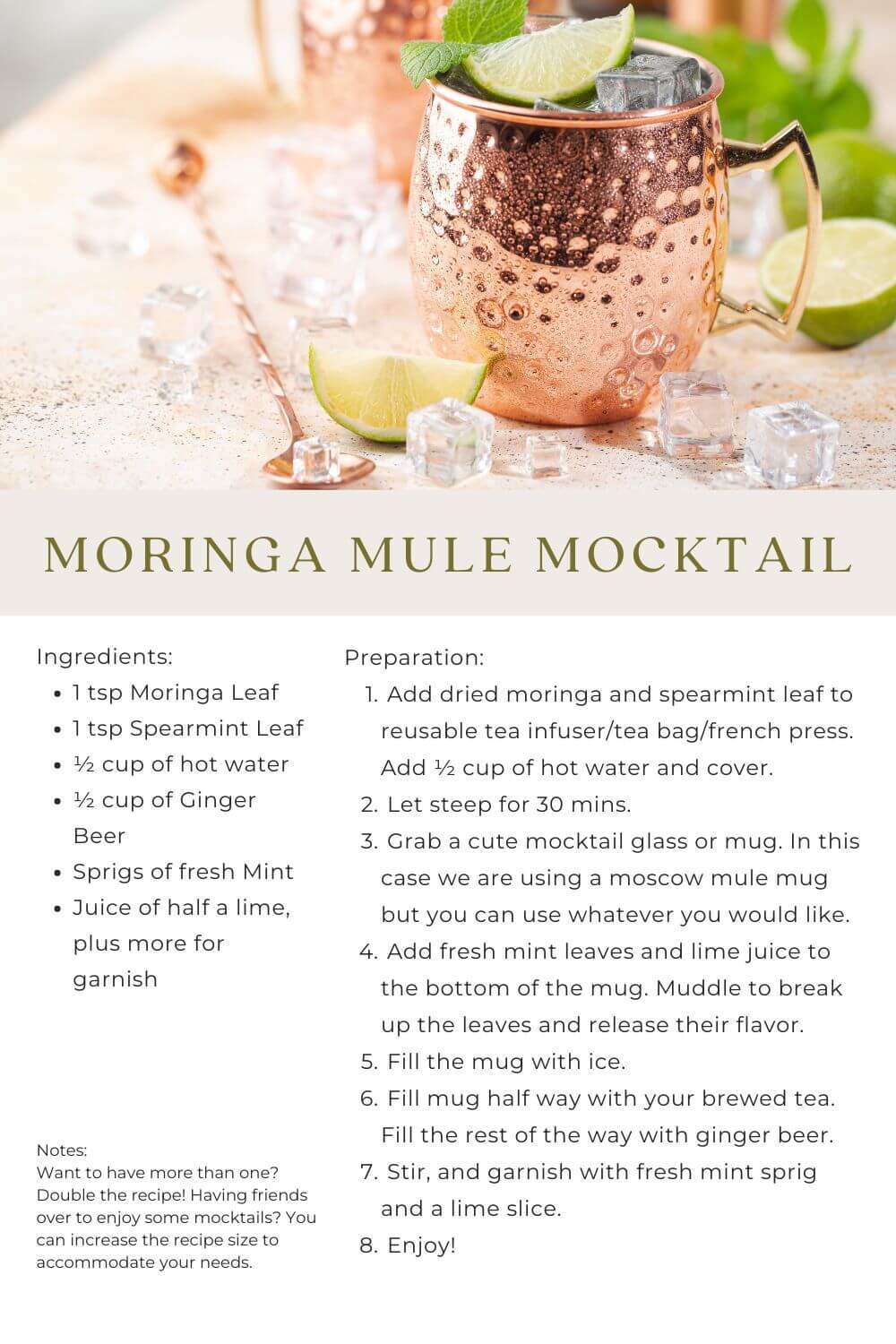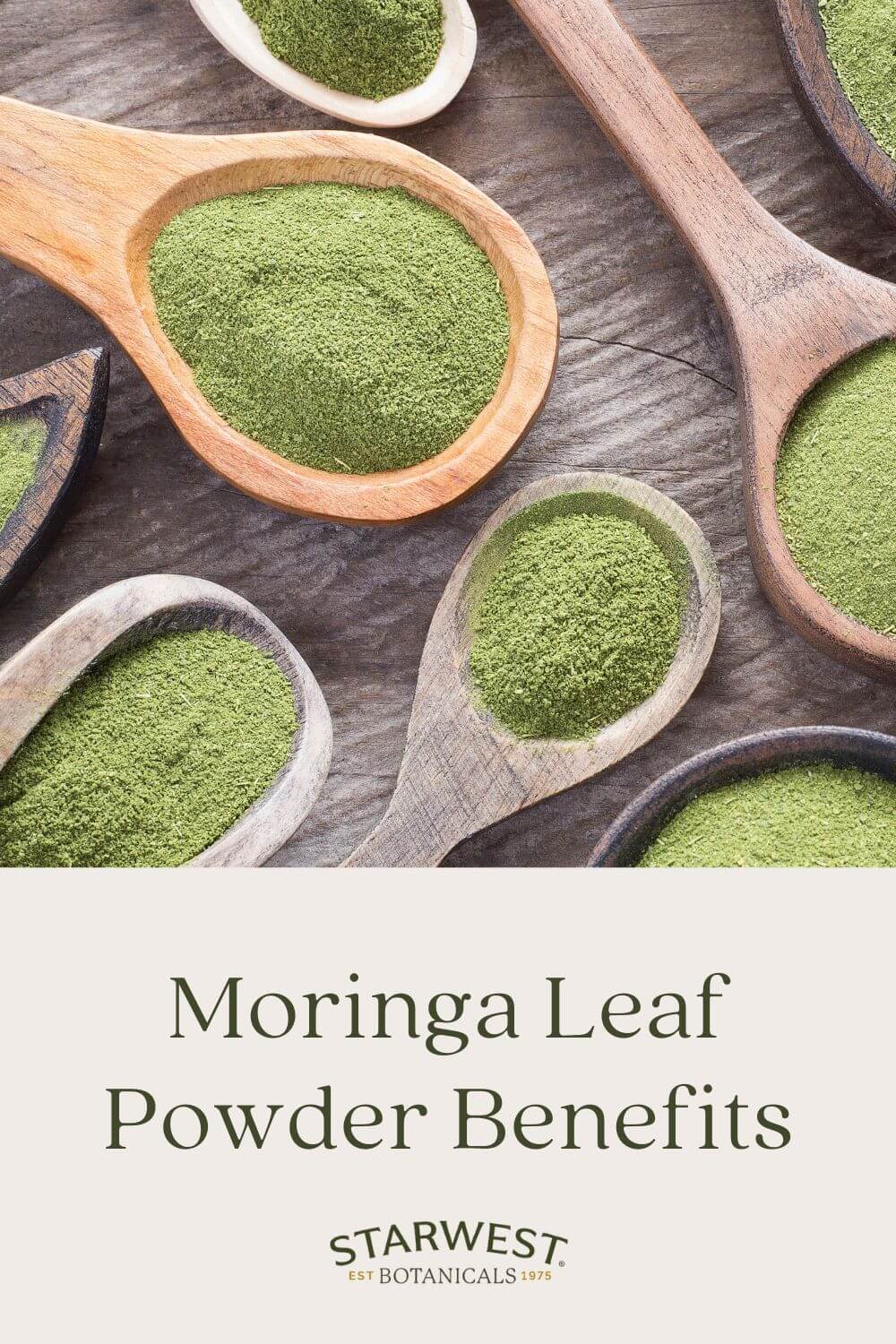Moringa Leaf Powder Benefits | Starwest Botanicals
Posted by Danielle Caster on 09-03-2024
If you are on social media, you may have heard about the benefits of Moringa popping up a time or two. It seems to be all over social media right now. But, if you are not yet familiar with Moringa’s benefits or why it is commonly referred to as the “Tree of Life” or “The Miracle Tree,” then you might be just as surprised as I was when I first started learning about Moringa. It seems almost impossible that so many possible benefits could be packaged into one plant.
Moringa, or Moringa oleifera, is a deciduous tree native to the dry Himalayan foothills of northwestern India that is now widely cultivated globally in subtropical and tropical climates.
Before I get into the health benefits of Moringa, I would like to point out that this tree is highly sustainable, growing from a small seedling to a mature tree in just a single year. Moringa is drought-tolerant, requires little water, and can survive in more places than it can’t. Though all parts of the Moringa tree may contain potential benefits—including the root, bark, flowers, and seed pods (also known as drumsticks)—the leaf is most commonly used, typically in powdered form. This leaf powder can be harvested once, sometimes twice, a year depending on the climate and is what I will be referencing.
Nutrient Dense: Moringa contains a wide array of vitamins and minerals, including vitamins B1, B2, B3, B6, K, E, D, C, and A. It also contains minerals such as manganese, copper, magnesium, zinc, phosphorus, iron, potassium, sodium, and calcium. In fact, Moringa has four times the amount of calcium found in cow’s milk, 25 times more iron than spinach, 15 times more potassium than a banana, four times more vitamin A than a carrot, and seven times more vitamin C than an orange. It’s no wonder some are calling it nature's multivitamin.
Amino Acids/Protein: Amino acids are the building blocks of protein, and our bodies use them for a variety of functions, including building muscle and other tissues. Moringa contains 18 out of 20 amino acids, including all nine essential amino acids, which is rare in a single plant. This makes it very beneficial for those who follow plant-based diets. Amino acids also play a huge role in neuronal and central nervous system functions, modulating immunity and metabolism, and enhancing the efficacy of antioxidants in the body.
Tryptophan: You’ve probably heard of tryptophan in connection with turkey around Thanksgiving, often blamed for post-meal sleepiness. Tryptophan is an amino acid that the body uses to make melatonin (the sleep hormone) and serotonin (the happiness hormone). Tryptophan may increase serotonin and melatonin, which may support mood.
Antioxidants: Moringa is loaded with antioxidants, including quercetin, which may help support a healthy inflammatory response. Antioxidants fight against free radicals and oxidative damage, which accumulate over time. I like to think of oxidation in the body as rust—imagine an old, broken-down car with rusty spots. Antioxidants act like rust removers, cleaning up those spots and helping the body function optimally.
May Support Energy Levels: With Moringa’s abundance of vitamins, minerals, and bioavailability, many people who consume Moringa (myself included!) report increased endurance and energy. The high levels of antioxidants may serve as natural energy sources, acting as cellular oxygenators.
Polyphenols: Moringa has a high concentration of polyphenols that protect against oxidative damage in the liver, support healthy blood pressure levels, and promote healthy and flexible blood vessels, which helps with circulation. They also support a healthy inflammatory response, which is important for heart health.
May Support a Healthy Metabolism: Moringa may help support a healthy metabolism. To maximize these metabolism-supporting benefits, take Moringa first thing in the morning alongside a healthy movement and nutrition routine.
Zeatin: Moringa leaves contain cytokinins, specifically zeatin, in concentrations two to three thousand times higher than any other plant. Cytokinins help plants repair and heal themselves, and in humans, zeatin has been shown to delay the aging process.
May Support Healthy Skin and Hair: It’s no surprise that Moringa promotes healthy skin and hair, given its rich supply of essential vitamins and minerals. People often report clearer, glowing skin and longer, shinier, healthier hair after regular use.
Mental Clarity: Moringa’s high density of vitamins, minerals, and other phytochemicals may also support mental clarity and mood. This was one of the first benefits I noticed after starting Moringa—the ability to think clearly and stay focused.
As you can see, Moringa is a nutrient-rich powerhouse. It is most commonly used in powder form and traditionally taken in a glass of warm water. However, you can add the powder to just about anything—smoothies, protein shakes, your morning matcha, sprinkled on avocado toast or oatmeal, or mixed into guacamole or hummus. The leaves can be added to soups, sauces (like spaghetti), sautéed with other greens, brewed as tea, or used in stir-fries.
Dosage:
1-2 teaspoons of powder or 1-2 tablespoons of dried leaf per day.

MORINGA IS NOT FOR EVERYONE
Large doses of Moringa might cause upset stomach, diarrhea, or nausea. Start with a low dose and work up to 1-2 teaspoons per day.
Moringa is not recommended for those who are pregnant, especially the root or bark of the plant.
Moringa should not be taken by individuals currently taking blood pressure or blood sugar medications.
Conclusion
In summary, Moringa truly lives up to its reputation as the “Miracle Tree,” offering an impressive range of benefits, from its dense nutritional content to its powerful antioxidants and amino acids. Whether you're looking to boost your energy, support mental clarity, enhance skin and hair health, or promote a healthy metabolism, Moringa is a versatile and sustainable option. Shop Organic Moringa Powder from a trusted source like Starwest Botanicals.

Danielle Caster is a Clinical Herbalist who uses her knowledge of herbalism along with a holistic approach to support women in achieving a more embodied way of living. Through one on one Herbal Wellness Sessions, Danielle curates custom holistic protocols, addressing the root cause and restoring balance to the body. Danielle finds joy in learning the ancient wisdom of the plants and is passionate about sharing that knowledge with others to bring a little ease in this busy modern world.
A mother of three and avid gardener. Danielle also enjoys growing a multitude of medicinal plants and vegetables, spending time with her family, traveling and reading.
For more information about working with Danielle please visit her website or follow her on Instagram.
- Moringa oleifera monograph by Nick Moya
https://www.herbrally.com/monographs/moringa
2.Anima Mundi Herbals
https://animamundiherbals.com/blogs/blog/meet-moringa-your-daily-multivitamin-with-a-libido-kick
3.Banyan Botanicals
https://www.banyanbotanicals.com/pages/plants-moringa-benefits?_pos=2&_sid=e43712c78&_ss=r#growing
4.Apelian, Nicole P.h.D & Davis, Claude
The Lost Book of Herbal Remedies, Claude Davis 2021, pgs 246, 247
- “Moringa Plants: Bioactive Compounds and Promising Applications in Food Products.” Food Research International. September 2018.
- “Moringa Oleifera: a Food Plant with Multiple Medicinal Uses.” Phytotherapy Research. January 2007.
- “Nutraceutical or Pharmacological Potential of Moringa Oleifera Lam.” Nutrients: Plant Food, Nutrition, and Human Health. March 2018.
- “Biological, Nutritional, and Therapeutic Significance of Moringa Oleifera Lam.” Phytotherapy Research. August 2019.
- “Cultivation, Genetic, Ethnopharmacology, Phytochemistry, and Pharmacology of Moringa Oleifera Leaves: An Overview.” International Journal of Molecular Sciences. June 2015.
- Overviews of Biological Importance of Quercetin: A Bioactive Flavonoid https://www.ncbi.nlm.nih.gov/pmc/articles/PMC5214562/



